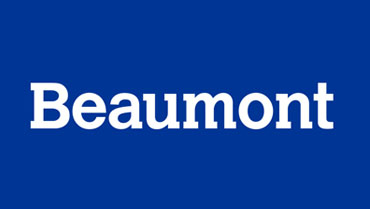Thursday, September 28, 2017
Lung cancer screening program and two-day brachytherapy for breast cancer among topics presented
Lung cancer is the No. 1 cause of cancer deaths in the U.S., claiming more lives than breast, colorectal, prostate and pancreatic cancer combined. Yet, when caught early, there are more treatment options and higher survival rates. Screening and early detection of lung cancer is key.
A model lung cancer screening program developed by a team of researchers, “The Beaumont Health Experience” is one of 25 studies presented by Beaumont radiation oncologists at the American Society of Radiation Oncology’s 59th Annual Meeting this week in San Diego.
Lung cancer screening program
Beaumont Health researchers studied the outcomes and cost-effectiveness of those patients who had a positive screening result and were diagnosed with lung cancer. From January 2014 to December 2016, 3,468 patients were screened on a low-dose CT screening protocol.
Said Thomas Lanni, lead researcher and vice president, Oncology Services, Beaumont Cancer Institute, “The establishment of a low-dose CT lung screening program improved the ability to screen patients as demonstrated by the number of patients screened and those diagnosed with cancer. Early detection of lung cancer saves lives. It is a critical first step in the path to affordable, quality patient outcomes.”
The study’s findings were consistent with those of the National Lung Screening Trial.
“Low-dose CT lung cancer screenings are 10 times more efficient at finding cancer than are colorectal screenings, mammography and PAP smears,” said Craig Stevens, M.D., Ph.D., chairman, Radiation Oncology, Beaumont Health. “A lung cancer screening program like ours can function well as a resource to providers, while identifying patients earlier to increase the chance for a cure.”
Researchers identified 624 participants with positive scores, from that group, 49 were diagnosed with lung cancer.
The American College of Radiology Lung Imaging Reporting and Data System was used to assign a score for each patient. Screening eligibility criteria were based on the Centers for Medicare and Medicaid Services guidelines and follow up based on Lung-Reporting and Data System guidelines.
A CT scan is a diagnostic test that uses X-ray beams, which are a form of radiation similar to light or radio waves, to create cross-sectional images horizontally and vertically of the body. CT scans are very detailed and can help doctors diagnose many conditions that may not be easily diagnosed with other imaging methods.
Back in 2012, Beaumont hospitals in Grosse Pointe, Royal Oak and Troy began offering a lung cancer screening program using CT imaging. The program was designed for early diagnosis of various lung cancers using low-dose CT, rather than the traditional chest X-ray. A CT lung cancer screening at Grosse Pointe, Royal Oak and Troy requires a written physician order. For more information or to make an appointment, call 800-328-8542. For Beaumont Hospital, Dearborn call 313-593-8045, and Beaumont, Farmington Hills call 248-471-8475.
Effectiveness of two-day brachytherapy for breast cancer
Peter Chen, M.D., Beaumont radiation oncologist and his research team, studied the long-term effectiveness of two-day brachytherapy to treat breast cancer. Between 2004 and 2007, 45 patients, ages 48-83, with early-stage breast cancer were treated with two-day accelerated partial breast irradiation.
“Our research demonstrated the two-day brachytherapy for selected early-stage breast cancer patients has excellent clinical effectiveness,” said Dr. Chen. “The accelerated treatment, not only shortens the irradiation to two days, compared to several weeks of whole breast external beam treatments, but has shown a positive impact on the patient’s quality of life.”
Accelerated partial breast irradiation, known as APBI, is an option for some patients with early-stage breast cancer.
“Accelerated radiotherapy is increasingly being adopted for early-stage breast cancer,” said Dr. Chen. “Our team assessed the long-term outcome of two-day brachytherapy accelerated partial breast irradiation. Most of the patients were followed nine to 10 years from the time of completing their brachytherapy.”
APBI is used to treat only the part of the breast at highest risk, rather than the entire breast. This technique delivers a high-activity radioactive seed about the size of a grain of rice through catheters, balloon-based, or strut-based brachytherapy applicators to the lumpectomy cavity with a one centimeter margin while minimizing radiation exposure to normal surrounding breast tissue.
Comparing effectiveness of brachytherapy to external beam radiation for breast cancer
In another study, Dr. Chen and a group of researchers compared brachytherapy to external beam 3-D conformal radiation therapy in the delivery of accelerated partial breast irradiation to women with early-stage breast cancer. Conformal external radiation therapy shapes the radiation to match the tumor shape.
Between 1993 and 2016, 784 patients were treated with accelerated partial breast irradiation: 567 with brachytherapy and 217 received 3-D conformal radiation therapy.
Dr. Chen said, “Accelerated partial breast irradiation with either brachytherapy or 3-D CRT in selected early-stage breast cancer patients results in comparable clinical outcomes in terms of local control and survival outcomes. Continued follow up will be needed to assess the long-term effectiveness and equivalence of these two forms of radiation treatments.”
About Beaumont Radiation Oncology
Beaumont Health’s Radiation Oncology department is ranked among the nation’s best for advanced technology, innovative treatment and research. Advanced radiation treatments used or developed at Beaumont include proton therapy, adaptive radiation therapy, image-guided radiation therapy, high-dose rate brachytherapy and hyperthermia therapy. Our radiation oncologists are actively involved in clinical research trials that study brain tumors, lung cancer, breast cancer, colorectal cancer and more.

